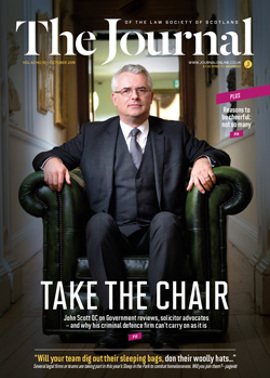Practice rights and Brexit: working in the UK

Last month’s article on the impact of Brexit on practice rights (Journal, September 2018, 42) focused on Scottish solicitors already based in another EU member state, and/or who wished to qualify into one by establishment/requalification. This month we will look at the potential impact of a no-deal Brexit on Scottish solicitors in the UK.
It is worth remembering that Brexit negotiations have focused on the terms of the Withdrawal Agreement, and not the terms of any future relationship between the UK and the EU – which can only begin once the first stage concludes. We cannot second-guess what potential outcome that might bring, but highlight that the UK Government did state its desire to reach an agreement on services in its white paper published in July, including legal services, and this could go well beyond what is contained in free trade agreements the EU has signed to date.
In the meantime, as with the technical notices from the UK and preparedness notices from the EU, this article sets out the position where the UK becomes a third country without a deal.
What EU membership currently enables
Leaving aside the ability to establish in another member state or requalify prior to Brexit – as discussed in our last article – enjoyment of the other EU Lawyers Directives currently gives Scottish solicitors the right to:
- advise clients in other member states on a temporary basis, on issues of EU law, domestic law (both UK and host state) and international law – under the Lawyers Services Directive 77/249/EC, with no requirement to register with the local bar;
- represent clients in the domestic courts and tribunals of other member states – under the Lawyers Services Directive, provided that advocacy is undertaken in conjunction with a host state lawyer;
- advise and represent clients in European Commission investigations – EU legal professional privilege is recognised for EU lawyers entitled to practise in any member state;
- represent clients in proceedings before the EU Intellectual Property Office (IPO) – as legal practitioners established in the EEA (see EU IPO Q&A); and
- represent clients in the European Courts – the Statute of the Court of Justice provides that a lawyer authorised to practise before a court of a member/EEA state may represent/assist a party before the European Courts.
Deal or no deal
If the UK and the EU reach agreement on the terms of withdrawal prior to exit day, then we can expect a transitional period where the rights accorded to Scottish solicitors by the EU Lawyers Directives should remain intact until <31 December 2020>. This may also give rise to other potential agreements on Scottish solicitors’ practising rights going forward.
If, however, no deal is agreed, the situation will change significantly – Scottish solicitors will be set to lose the rights under the directives set out above as of 30 March 2019. This does not rule out other potential agreements for Scottish solicitors’ practising rights going forward, but these will probably not be applicable on exit day.
No-deal impact on practice rights
Scottish solicitors will still have an unrestricted right: to advise on Scots law to UK and EU clients based in the UK.
For clients based in the EU, Scottish solicitors will mostly be able to advise on Scots law and private international law by email or over the phone, and – provided visa requirements are met – in person on a “fly-in fly-out” basis in certain member states. This will be dependent on national regulations, and the terms of the EU’s WTO Services Schedule – the General Agreement on Trade in Services (EU GATS Commitments). The applicable rules should be reviewed for each individual scenario.
Scottish solicitors will lose their respective rights: under the EU Lawyers Directives. This will prevent them advising clients in other member states on a temporary basis on EU, host state or international laws; co-representing clients in the courts/tribunals of other member states (also dependent on national regulation); advising/representing clients in European Commission proceedings on a sole basis (EU privilege rights will no longer attach); representing clients in IPO proceedings; and representing clients before the European Courts (rights of audience will no longer apply).
Falling back on the EU GATS Commitments, it is also important to note that third country non-EEA lawyers must provide only “legal advice on home country law and public international law (excluding EC law)”. While it is possible in theory for member states to grant higher levels of access to foreign lawyers, most member states have not done so, and so each should again be checked on an individual basis.
In addition, Scottish solicitors will not be able to give fly-in fly-out advice unless they register a physical presence as non-EEA lawyers in Austria, Belgium, Bulgaria, Cyprus, Estonia, France, Finland, Germany, Hungary, Italy, Latvia and Spain. Again, some other specific rules apply for individual member states, depending on the type of legal advice involved – see bit.ly/2QooxkF for further information.
This could have the following potential effects in practice:
(i) preventing Scottish solicitors providing Scots law including private international law advice on a fly-in fly-out basis to UK and other clients based in certain EU member states where they are not established – additionally, complexity will be added since
(ii) preventing Scottish solicitors providing EU advice in any form to UK and other clients based in other EU member states;
(iii) preventing Scottish solicitors providing host state advice in any form to UK and other clients based in other EU member states; and
(iv) dissuading UK clients based in the UK from obtaining EU legal representation from Scottish solicitors, since they will not benefit from rights of EU legal privilege, nor the rights of audience for the European Courts.
Some practical workarounds
Notwithstanding the above, there may be some practical workarounds:
- Nothing appears to prevent a Scottish solicitor advising a UK based client on EU law – however, it would have to be made clear from the outset that such advice/communications would not benefit from EU privilege.
- As US lawyers based in Brussels seek to protect their clients’ EU privilege by copying EU qualified colleagues on all correspondence and attending meetings together with the European institutions, so too could Scottish solicitors working at international firms, or with partner European firms.
- High level technical analysis, such as multi-jurisdictional merger analysis, could be argued as not constituting “reserved” legal advice. This largely involves calculations based on turnover thresholds from around the world, and not substantive legal analysis. In practice, borderline cases are referred to local counsel, who also provide the substantive advice on the merger filings.
The Irish route
Irish re-qualification offers apparent rights to continued EU practice for Scottish solicitors, which a number of individuals have already undertaken. English-qualified solicitors benefit from a mutual recognition arrangement after three years of practice, between the Law Societies of Ireland (LSI), and England & Wales (LSEW). The process is more complex for Scottish solicitors, who must sit the LSI Qualified Lawyers Transfer Test (unless dually qualified with LSEW).
In practice, many Scottish solicitor candidates have been able to achieve a level of exemption on cause shown. The Society is working with LSI to identify areas where blanket exemptions may be granted.
However, whether the Irish route will guarantee continued EU practice rights post-Brexit cannot be tested, and some hurdles may lie ahead. It has been argued in certain EU quarters that rights of audience at the EU courts should only stem from direct practice in the member state in which the lawyer holds the practising certificate (PC) – a potential issue where Scottish solicitors do not practise in Ireland. Similarly, others debate that use of the Irish PC to simply obtain rights of audience at the EU courts would amount to an abuse of process. Opinion has also questioned whether the Irish PC can afford rights of EU privilege to a non-EU lawyer, not practising in Ireland, and who is not subject to Irish professional ethics rules on a day to day basis. Finally, there are also no guarantees that EU rules will not be amended at some point in the future in an attempt to immobilise this route to EU practising rights for Scottish solicitors.
In light of this, Scottish solicitors who have, or intend to obtain, an Irish PC prior to Brexit may wish to consider the following:
- obtain the Irish PC prior to Brexit and keep it maintained (don’t only rely on registering on the roll);
- comply with all Irish continuing professional development requirements and have this well documented;
- advise clients based in Ireland;
- advise from Ireland occasionally; and
- obtain EU citizenship.
Representing our members
The purpose of this article is to give a practical account of the effect a no-deal Brexit could have on Scottish solicitors’ practising rights – where, at least to start with, we would fall back on the EU GATS commitments.
Given the sheer scale of cross-border family life and commercial activity, the Law Society of Scotland is committed to promoting to EU colleagues and justice ministries the benefits of maintaining continued access for Scottish and EU lawyers to each other’s legal services markets. This is not only for Scottish solicitors, but also for the individuals and businesses that they advise.
We have been actively involved in a number of initiatives focused on protecting members from the potential consequences of Brexit, and these will be further explained in future articles in this series.
In this issue
- Online and out of line
- Timing the test for detriment
- The power of conversation
- Making Scotland an ACE aware nation
- Reading for pleasure
- Opinion: Jane Mair
- Book reviews
- Profile: Amanda Davy
- President's column
- Round Scotland from A to Z
- People on the move
- When crime no longer pays
- Hold tight for Brexit
- Debt: finding the right formula
- The thick of it
- Fringe benefits boost conference appeal
- Private revolution
- Document Data Group Form Partnership with Law Pro
- Where have all the new firms gone?
- New specialist land registration practice launches
- Sentences in many guises
- Law firms: how to attract and retain the best talent
- Licensing Armageddon – again?
- Planning Bill changing shape
- HMRC called offside in referees case
- Powers of attorney: two essential practice points
- Better access to the law
- Finding the right blend
- Look out for AML certificate launch
- Public policy highlights
- Clients, care, competence and... cancer
- Practice rights and Brexit: working in the UK
- Claims of our age
- Ask Ash
- Paralegal pointers
- A sleep in the park






